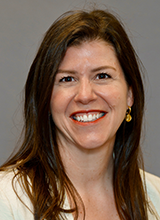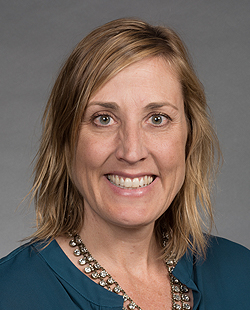Personal Statement
I am the Psychiatry Chief of Service for both campuses of the University of Washington Medical Center. I also direct our Psychiatric Consultation and Telepsychiatry Program. My clinical focus is on patients who are hospitalized with simultaneous psychiatric and medical issues. Academically, I most often teach psychiatry trainees about psychopharmacology for refractory mood, anxiety, and psychotic disorders.

Personal Statement
My research focuses on understanding and addressing the contextual factors like social support and policy that affect health and health behavior. I completed a VA Health Systems Research (HSR) Career Development Award focused on developing a behavioral weight management program for Veterans with PTSD called MOVE!+UP (2015-2020). We are currently testing MOVE!+UP in a VA HSR Merit-funded study using a hybrid effectiveness and implementation RCT design. I recently led another VA HSR Merit-funded study as Principal Investigator (PI) to test a self-directed behavioral weight management intervention among 500 Veterans with obesity; the findings were published in JAMA: https://jamanetwork.com/journals/jama/fullarticle/2799407. I am Co-PI for two additional VA HSR Merit-funded studies, both RCTs testing behavioral interventions that harness the power of social support. Last, I am Co-PI for a VA operations-funded project called MOVED By LOVE, a multi-method study that is partnering with Black Veterans to enhance how weight management care in VA serves Black Veterans. The first findings from the study were recently published in the Journal of General Internal Medicine: https://link.springer.com/article/10.1007/s11606-024-08628-7. I am fortunate to work with Veterans with PTSD as a staff psychologist in the VA Puget Sound-Seattle PTSD Outpatient Clinic. Lastly, I have an interest in maximizing research impact by communicating about science with Veterans, the public, institutions, and policymakers.

Personal Statement
I am a clinical psychologist with research interests in the treatment of alcohol and substance use disorders and co-occurring mental health conditions.
My research focuses on understanding how to improve access to evidence-based treatments and understanding why and how patients benefit from treatment. I am particularly interested in research measurement-based care — i.e., the use of standardized measures to monitor treatment progress and inform clinical decision-making.
Broad areas of interest include:
- Alcohol and drug use disorder treatment, including the effectiveness of digital and behavioral interventions, mechanisms of behavioral change, and social and environmental determinants of change.
- Technology to support behavioral change, including patient- and clinician-facing tools that support clinical decision-making, treatment adherence, and treatment progress monitoring.
- Applied statistical analysis, including methods for analyzing longitudinal data, clinical trials data, multilevel data, missing data, psychometric analysis, and data visualization.

Personal Statement
My primary research and clinical interests are in the diagnosis and etiology of autism. I am passionate about teaching and training in autism and developmental disabilities, and improving access to care and building community capacity for this population. I am the director of the Clinical Training Unit at the Institute on Human Development and Disability (IHDD), and direct the UW Leadership Education in Neurodevelopmental and related Disabilities (LEND) program. I am also the track coordinator for the Autism and Developmental Disabilities Psychology Internship training program and an attending psychologist at the Seattle Children’s Autism Center where I conduct diagnostic evaluations for autism and supervise a variety of trainees. I am investigating various methods for diagnosis in an effort to streamline the process and decrease wait times for an initial diagnostic evaluation for autism. I am involved in implementing and evaluating several Project ECHO programs at IHDD with primary care providers in Washington State, with a goal of improving access to autism-related care closer to home. In the past, I was part of research examining the genetic landscape of autism in order to create meaningful subtypes of the disorder, with a hope of individualizing treatments for people with autism in the future.

Personal Statement
I am a Professor in the Department of Psychiatry and Behavioral Sciences at the University of Washington School of Medicine, and the Director of the Division of Population Health. I am also a Core Investigator at the HSR&D Center for Innovation for Veteran-Centered and Value-Driven Care at the VA Puget Sound Health Care System, and the Director of the VA Virtual Care QUERI Program.
For the last 35 years, my research has focused on access to care. I have published a framework for conceptualizing access to care in the digital age that incorporates virtual care technologies. I have conducted clinical trials to test the effectiveness of virtual care technologies to facilitate the delivery of evidence-based mental health services in rural primary care clinics. I have also conducted implementation trials to test the effectiveness of strategies to promote the uptake of virtual care technologies by primary care patients and providers. My research has been supported by NIMH, NIAAA, PCORI, and VA HSR/QUERI.

Personal Statement
Douglas Zatzick, M.D. is currently a professor in the Department of Psychiatry and Behavioral Sciences at University of Washington School of Medicine. Over the past two decades, he has developed a public health approach to trauma-focused research and clinical work that has emphasized clinical epidemiologic, functional outcome, and early intervention studies of posttraumatic stress disorder (PTSD) and related co-morbid conditions. From 2009-2012, he served as Chairperson of the National Institute of Mental Health, Services in Non-specialty settings (NIMH, SRNS) Study Section. He served on the congressionally mandated United States Institute of Medicine four-year ongoing assessment of PTSD treatment, and the World Health Organization PTSD Guideline Development Group. He has participated in disaster relief and early intervention efforts after Hurricane Katrina and the January 2010 Haiti earthquake. He was medical director of the University of Washington’s Harborview Level 1 Trauma Center Psychiatric Consultation Liaison Service, and in this capacity provided front-line clinical services to ethno-culturally diverse acutely injured trauma survivors. As a part of multidisciplinary collaborative group that includes empiricist trauma surgical policy makers, he is working to use clinical trial results to influence policy for PTSD screening and intervention at trauma centers throughout the United States.

As a board-certified clinical health psychologist, I have primarily focused my clinical work on preventive medicine with special expertise in diabetes, weight management, and tobacco use cessation. I train clinicians in motivational interviewing and health coaching, and am currently a co-investigator on a research study examining an intervention with peer health coaches in the Veterans Health Administration (VHA). After nearly two decades of working in complex healthcare settings, like the VHA and serving in several leadership roles within and external to the VHA, I have grown a passion for supporting those who serve others and improving workplace well-being. I am an Associate Certified Coach and am enrolled in a Masters program in Leadership and Organizational Development. I coach leaders and individual contributors on their professional and personal goals, help teams work better together, engage clinics in identifying and implementing meaningful changes to improve workplace satisfaction.

Alysha Thompson, PhD is the Clinical Director and attending psychologist on the Psychiatry and Behavioral Medicine Unit at Seattle Children’s Hospital and Associate Professor in the Department of Psychiatry and Behavioral Sciences at University of Washington. Prior to joining the staff and faculty at Seattle Children’s/UW, she was a staff psychologist on the Adolescent Inpatient Unit at Bradley Hospital and Clinical Assistant Professor in the Department of Psychiatry and Human Behavior at Brown University. She is an active participant in training future psychiatrists and psychologists and currently serves as Chair-Elect of the Acute, Intensive, and Residential Services Special Interest Group of Division 53 of the American Psychological Association, a national group of psychologists.
Dr. Thompson has authored multiple publications regarding inpatient psychiatric treatment for youth and has forged collaborations with psychiatrists and psychologists working in inpatient psychiatry and acute care around the country. In addition, she is actively engaged in advocacy efforts regarding improvement the mental health care system for youth. She is passionate about providing quality services to youth experiencing severe mental health crises and has specific areas of expertise in working with youth with trauma histories and suicidality.
Dr. Thompson completed her graduate education at Suffolk University in Boston in clinical psychology with an emphasis in child and adolescent clinical psychology. She completed residency in pediatric psychology at Rush University Medical Center in Chicago and went on to complete a fellowship in clinical psychology with an emphasis in trauma in children and adolescents at the Trauma Center at Justice Resource Institute.










